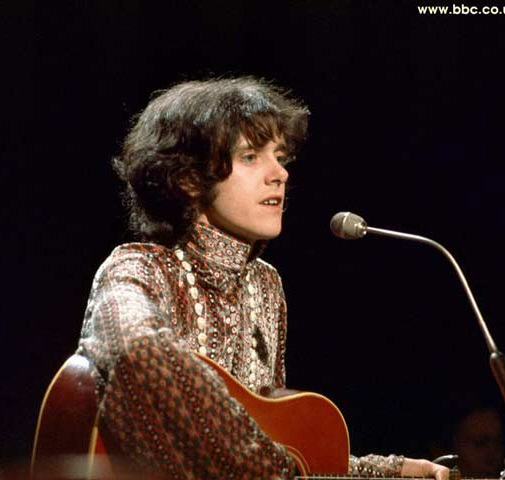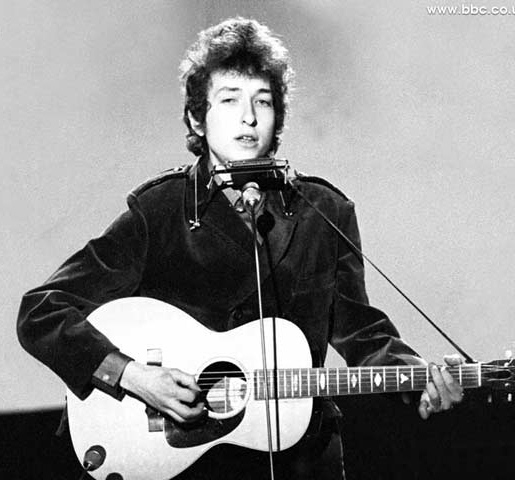In Don’t Look Back, a fantastic 1965 documentary of Bob Dylan on a tour of England, there’s an interesting backstage scene where Bob Dylan takes on his British rival Donovan in a song duel. Donovan goes first, playing a sweet and clever little love song, “To Sing for You.” Dylan cracks a cocky grin, “yeah, that’s a good song, man.” But now it’s my turn, and the arrogant, stoned face of Dylan demands the camera, demands the whole room as he breaks into “It’s All Over Now, Baby Blue,” a darker, more literary, seemingly more “deep” effort compared to Donovan’s sweet simplicity and pure delight. Despite his winning confidence, Dylan loses, as I have said (to the disbelief of others) since I first saw the scene. Donovan possesses a fresher, more humane spirit, and that wins over Dylan’s folk pretensions. A comparison of the first stanzas:
“To Sing for You”
When you’re feeling kind of lonesome in your mind
With a heartache followin’ you so close behind
Call out to me as I ramble by.
I’ll sing a song for you,
That’s what I’m here to do,
To sing for you.
He has found his purpose, to sing, and he has found a demand - people, mentally lonesome people who need a song. People stalked by heartache who need a singer. Aren't we all on the verge of heartache? Aren't we all in a state of song need? Yes, and that's what makes a song-singer with a sense of purpose like Donovan so essential. He's the example, the need-free independent rambler. Notice Donovan doesn't need the heartbroken like they need him. The singer doesn’t seek out the heartbroken. They have to call out to him, they have to interrupt his “rambling by.” You have to come to me, Donovan says, and then I will give you what you need. There's an imbalance to that set-up, but the exchange is purely pastoral. Commerce is idealized. There's no money exchanged, no copyright protections, no marketing, no image-making; just feelings, songs, and singing. How nice.
“It’s All Over Now, Baby Blue”
You must leave now, take what you need, you think will last
But whatever you wish to keep, you better grab it fast
Yonder stands your orphan with his gun
He's crying like a fire in the sun
Look out, all the saints are coming through
And it's all over now, Baby Blue
-There’s leaving, taking, thinking, lasting, wishing, keeping and grabbing to do, and there’s not much time.
Why?
-Because of your orphan.
My orphan?
-Yeah, your orphan yonder, with his gun, the one “crying like a fire in the sun.”
Fires cry in the sun?
-No man, you’re not getting it, it’s not literal, it’s a metaphor, it’s “like” a fire in the sun.
There’s a fire in the sun?
-Uh yeah, the sun’s a huge ball of fire.
But how does the fire cry?
-Look, you don’t get it okay. You’re not getting the vibe.
Has Dylan been to the sun?
-What?
Has he traveled to the sun?
-NO!
Then how does he know what goes on in there?
-Look you’re not thinking right, you’re thinking too literally. He’s not--
How would he know the fires are sad?
-Oh my god, I can’t believe this.
Well they’re crying, the fires are crying. That means they’re sad right?
-What?
If the fires in the sun are crying, that means they’re sad.
-No. It could mean they’re in pain. You can cry for a lot of reasons.
Okay, right. They’re in pain from the fire. They could even be happy. You can cry if you’re really happy, happy tears. They could be crying for joy.
-Yeah. Absolutely.
But if the fire is painful, why would they be happy about it?
-You’re thinking too literally. It’s not about the actual sun. A crying fire within the sun is an image of pure poetry. Fire is a force of destruction, a hidden energy in all things. The sun preserves us with its warmth, but that warmth resonates from an unstable mass of chemical explosions and nuclear turmoil consuming all that comes near it. The "crying" of the fires compares human emotional instability with the burning indeterminacy of the sun's bubbling, geographically ambivalent mass. The fire is death. The orphan is death. The gun is death. Even the saints are destined to cry in the fires. What a horrific scene. You're charred, but you're eternally alive enough to cry. Dylan's lines are full of these powerful images. Stanza Two:
The highway is for gamblers, better use your sense
Take what you have gathered from coincidence
The empty-handed painter from your streets
Is drawing crazy patterns on your sheets
The sky, too, is folding under you
And it's all over now, Baby Blue
The sky “is folding under you.” Wow! That’s powerful stuff. Because how? How could the sky fold? We are thrust into the two-dimensional. Our horizon is a piece of grade school drawing paper. The “sky” is a crayon-scribbled patch of Crayola “sky blue” crumpling into a fold. And here’s the twist. The sky is not over you, as we would expect; the sky is “under” you. Whoah! We’re upside down! The sky is folding under you. Dylan cancels gravity. We are standing on a two-dimensional “sky,” weighing it down into a fold. Below us is the ground, which we are falling further away from. Under us the sky is caving in. We are going to fall through the sky. What happens when we do? It’ll be all over, Baby Blue.
Dylan's "highway" is where the two song's converge. The human highway is exactly where Donovan meets his audience in "To Sing for You" It's where he's always "rambling by," where he exchanges heartache for song in hippie serenity. In contrast, Dylan's highway "is for gamblers," a pointless place which demostrates cynical truths. "Sense" is merely "what you have gathered from coincidence." Dylan cancels cause-and-effect. You have no experience, only a coincidental series of events you're better off ignoring. You think you have learned, you think you know, but you have merely been fooled by the lie of knowledge. Knowledge is only possible if there are relationships between things. In a world of pure coincidence there are no relationships. Nothing has anything to do with anything else. How nice.
But then an "empty-handed painter" suddenly appears "drawing crazy patterns on your sheets." An image out of nowhere. An example of how we connect coincidences to bring meaning to events? That would be a stretch. A senile bum invading bedrooms with hallucinatory, insane pattern drawing? We're lost in two throw-away lines. We're into it, out of it, into it. Dylan, a modernist, can resort to flights of cop-out obscurity, lines which read like great examples of why poetry should not rhyme. Dylan might have read his Milton, who rails against rhyming in a short prologue to Paradise Lost: "the jingling sound of like endings" is "to all judicious ears trivial and of no true musical delight." Rhyming is a "fault" the ancients (Homer, Virgil) learned to avoid. Dylan's "streets" - "sheets" jingle is what Milton would call "lame invention."
Now to be fair let's look at Donovan's next Stanza:
When the night has left you cold and feeling sad
I will show you that it cannot be so bad
Forget the one who went and made you cry
I'll sing a song for you,
That's what I'm here to do,
To sing for you.
With his "song" Donovan (the singer) will counter the characterization of the "night" as a heartless, discomforting enemy to good feelings. He will show you the bright side of the night. He emphasizes selective memory. Simply forget the bad people in life. Remember the song instead. Remember the singer. Remember the importance of purpose, the error of meaninglessness. Donovan's "sad" - "bad" is a disgusting atrocity Milton would call "wretched matter." But again "To Sing for You" is a more musically driven song. The refrain lyrics ("I'll sing a song for you,/ That's what I'm here to do,/ To sing for you.") are the only words you notice, and they fit beautifully with the music.
We have the pop coherence and clarity of Donovan matched against the more vague, more improvisational and metaphorical rhyming of Dylan. The pastoral versus the apocalyptical. I feel most would say Donovan’s “To Sing for You” is a catchier song musically, but many would say Dylan’s “Baby Blue” is more haunting and interesting lyrically and therefore better. Consider: “To Sing For You” is an earnest celebration of a man who has found his calling, a man freely charging ahead in a life sweetened with purpose. The song sparkles with the clarity and potential energy of a renewed mind. With how it expresses the joy and beauty of finding one’s purpose Donovan’s song achieves universal scope and relevance.
Dylan’s “Baby Blue” fails to come through. Forced rhymes mire the song in vagueness. We never know what’s at stake enough to care about Baby Blue. The random imagery smacks of novice pot smoking. Dylan wins with critics because his spews of semi-clever nonsense leave room for creative criticism. In Lewis Carrol, nonsense is smart, comical, philosophical. In modernism nonsense becomes "obscurity," a trick from James Joyce which targets the needs of the industry of criticism: whatever is most difficult, most puzzling, that will last the longest, because it will take the longest to figure out.
Modernism by encouraging originality inadvertently encourages its dull little sister - obscurity, a method good for the critic, giving him more room to work; good for the artist, opening up for thim the easy road of not having to make sense; but bad for the audience, because it becomes too specialised and thus out of touch with how people actually process entertainment art. With the rise of criticism as an academic industry, there are now two "good"s - the audience's, and the critic's. The industry of criticism is totally irrelevant, as it should be, to an audience that simply wants to see something powerful. Whether the work is or isn't breaking certain insider rules or how it compares to other works, or how it does or does not subtly mean one thing or another, that's not the thinking except in an industry corrupted by its own self-interest, which is criticism then and now. That corrupted criticism, which refuses to acknowledge the role of its self-interest, will continue to promote and glorify the Bob Dylans of the arts, the bold James Joyces. Like Joyce, Dylan's work advertises a critical reception. It panders to a certain academic sensibility. Dylan knows how to be "good" according to the majority definition in the criticism industry. The problem is Dylan fails to achieve both "good"s. He can achieve only one, the critic's "good". His work lacks the quality to achieve both the critic's "good" and the audiences "good."
The Don't Look Back song duel shows this whole process, the divide between two "good"s. In that room with those people Dylan is the clear winner - an inspired talent with unknown depths of artistic soul who renders Donovan a pitiable wannabe chirping a little cartoon ditty. But today other interpretations become possible. We can analyze Dylan as a user of techniques designed for specific targets and limited to a certain kind of achievement.


